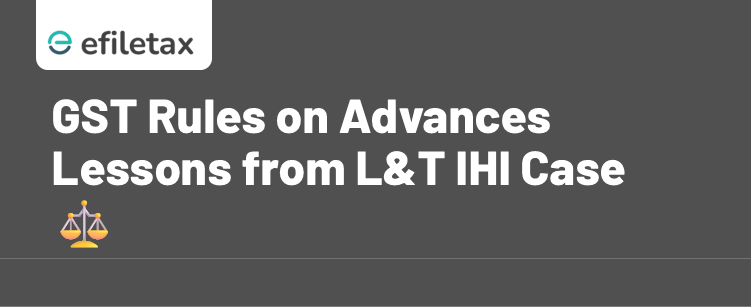
Case Title: L&T IHI Consortium v. Union of India and Others
Court: High Court of Judicature at Bombay
Bench: Hon’ble Justice G.S. Kulkarni & Hon’ble Justice Jitendra Jain
Judgment Date: 14 November 2024
Introduction: Key Questions of Law L&T IHI Case
The L&T IHI Consortium case is a pivotal legal battle highlighting the complexities in India’s GST laws. It addresses the challenges faced by taxpayers when advance payments under contracts are taxed as “supplies agreed to be made,” even though the actual supply of goods or services may not have occurred. This judgment also questions the constitutional validity of Sections 7, 12, and 13 of the Central Goods and Services Tax (CGST) Act, 2017, and their corresponding provisions under the Maharashtra GST (MGST) Act.
Key issues addressed include:
- Taxability of advance payments as supplies.
- Restrictions on Input Tax Credit (ITC) for unexecuted services.
- Refund denial under GST provisions.
Background of the Case L&T IHI Case
The petitioner, L&T IHI Consortium, a joint venture between Larsen & Toubro Ltd. and IHI Infrastructure Systems Co. Ltd., was awarded the Mumbai Trans Harbour Link Project. This massive 22 km sea bridge connects South Mumbai to Nhava Sheva in Navi Mumbai.
Core Issue L&T IHI Case
The consortium received advances (treated as loans under the contract) from the Mumbai Metropolitan Region Development Authority (MMRDA). Despite no actual supply being made, the advance was taxed under GST. The consortium argued that:
- Taxing advances as supplies is unconstitutional.
- ITC denial due to non-receipt of services violated their rights.
- The provisions of the GST Acts were arbitrary and caused financial hardships.
Legal Provisions in Question
- Section 7 (CGST Act): Defines supply, including “supplies agreed to be made,” broadening the scope of taxable transactions.
- Section 13 (CGST Act): Stipulates that advances trigger the “time of supply,” leading to GST liability even before actual service or goods are delivered.
- Section 16 (CGST Act): Restricts ITC claims until the actual receipt of goods or services.
- Section 54 (CGST Act): Limits refund of unutilized ITC to zero-rated supplies or inverted duty structures, excluding taxpayers like the consortium.
Petitioner’s Arguments
- Constitutional Challenges
- The petitioner argued that taxing advance payments as supplies contravenes Article 246A, which allows GST to be levied only on the “supply of goods or services.”
- It claimed that Sections 7, 12, and 13 of the CGST Act were ultra vires the Constitution.
- Unjust ITC Denial
- The denial of ITC for GST paid on advances led to double taxation.
- The petitioner highlighted a contradiction: advances were taxed as if supplies had occurred, but ITC was denied until the actual supply.
- Refund Restrictions
- Section 54(3) barred refunds of unutilized ITC, causing financial strain.
- The consortium sought the refund of GST paid on advances amounting to ₹64.64 crores.
- Disproportionate Tax Burden
- The consortium argued that taxing advances added an unnecessary cash flow burden, especially for large infrastructure projects.
Respondents’ Defenses
- Validity of GST Provisions
- The respondents argued that taxing advances aligns with the legislative intent under Article 366(12A).
- They contended that the provisions were clear and legally sound.
- Nature of Advances
- The government maintained that the amounts received by the petitioner were “mobilization advances” and not loans.
- Section 13(2) was invoked to justify taxing advances at the time of payment.
- ITC and Refund Eligibility
- Respondents argued that ITC could not be claimed until services were rendered, as per Section 16(2)(b).
- They also defended the limitations on refunds under Section 54(3), stating that the consortium’s situation did not fall under eligible refund categories.
Observations by the Court of L&T IHI Case
- Taxation on Advances
- The court scrutinized the legitimacy of taxing advances as supplies. It noted that such taxation imposes an undue burden on taxpayers without the actual occurrence of a taxable event.
- Contradictions in GST Provisions
- A key inconsistency highlighted was the simultaneous taxation of advances and the denial of corresponding ITC.
- Refund Denial
- The court questioned whether restricting refunds for unutilized ITC under Section 54 was arbitrary and unreasonable, especially in cases involving large government contracts.
- Impact on Infrastructure Projects
- The court acknowledged that such GST provisions disproportionately affect consortiums formed for specific projects, increasing costs and complicating compliance.
Judgment Highlights
- The court reserved certain questions for further examination but emphasized the need for clarity and fairness in GST provisions.
- While the broader constitutional challenges were not conclusively resolved, the judgment called for a balanced approach to taxation, particularly for advance payments in long-term contracts.
Implications of the Judgment
- For Businesses
- The case underscores the importance of carefully drafting contracts to address tax implications on advances.
- Businesses must actively monitor ITC eligibility and compliance timelines to avoid cash flow disruptions.
- For GST Framework
- The judgment raises critical questions about the constitutionality of taxing advances without corresponding ITC.
- It may pave the way for future legislative amendments to address these inconsistencies.
- Policy Recommendations
- Greater clarity is needed in distinguishing between loans and advances under GST.
- Refund mechanisms for unutilized ITC must be expanded to prevent undue financial strain on taxpayers.
The L&T IHI Consortium case highlights the complexities of India’s GST framework and its impact on taxpayer rights. By addressing key issues such as the taxability of advances and ITC denial, this judgment serves as a critical reference for businesses and policymakers alike. As the GST regime evolves, striking a balance between revenue collection and taxpayer fairness will be essential for sustainable compliance and economic growth.